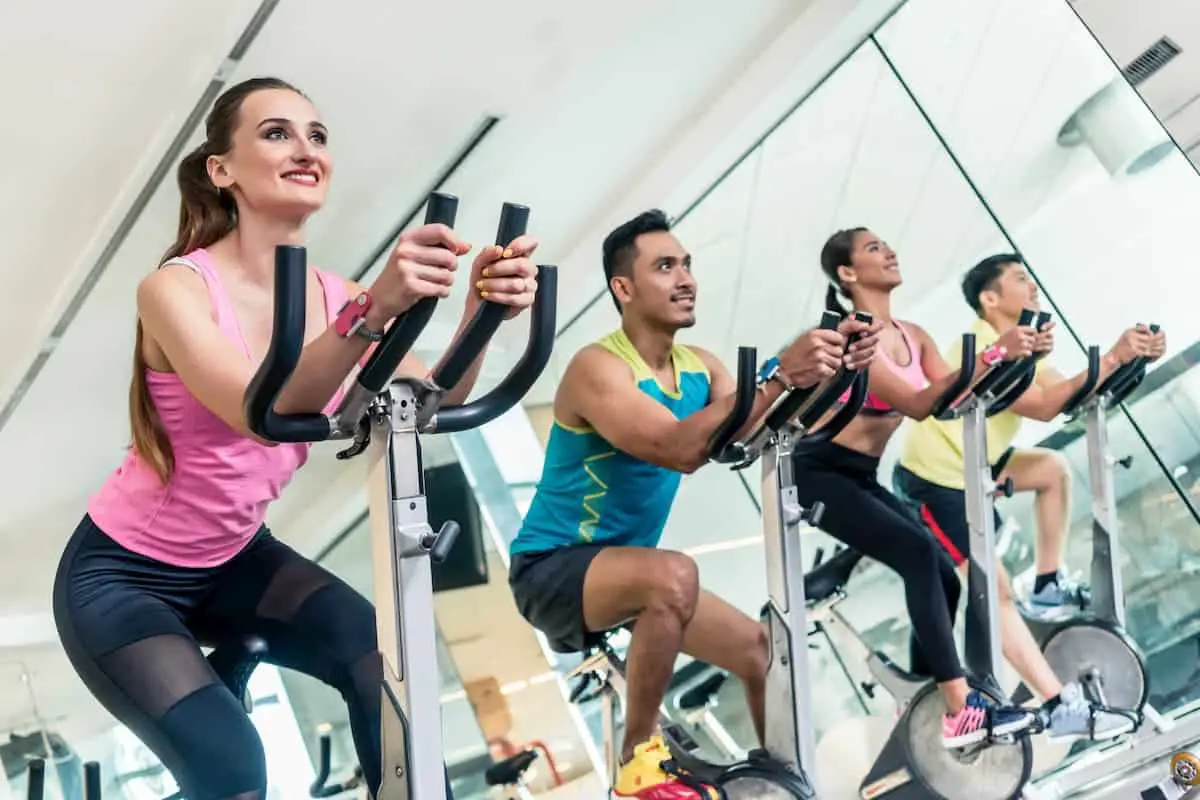I remember when the best tracker was a simple pedometer with a little interior counter that counted your steps and just gave a number at the end of the day.
No longer the case as technology has strode forward it has given us bountiful data that most don’t even know how to use to get results, well today we dive into are fitness trackers really worth it.
Yes, hands down, they help keep almost everyone motivated and moving, helping keep activity levels going. There are options available to manage any sport or activity, allowing for an increased understanding of how much effort and activity each generates, sleep length and quality, and much more.
Why would you want to measure all those numbers and details, well to learn more about yourself and get better data?
The science involved in measuring is lengthy and always up for debate as to overall use but I can tell you first hand they only work if you buy in fully and use the data to change your behaviors!
How Can a Fitness Tracker Help You?
Most of the time people choose to add a fitness or activity tracker for a specific need like work gives discounts for steps over the year to show overall health.
Or you may have just decided you like those “biohackers” and they say more data is always more helpful, I would tend to agree.
There are a great many ways a tracker may help you and there are some which will track more data than others.
You need to understand in your choice here what data you need and what devices can provide that detail for you.
Let’s take a look at the most common items which can be tracked on a fitness tracker or activity tracker.
This will help you figure out what data you are the most interested in gathering and using to get your results.
Tracking Your Steps
This is the main purpose of pretty much every fitness tracker available on the market today.
Helping you try to keep track of your overall movement and trying to help you commit to increasing your motion.
The start of the fitness and activity trackers is what yielded this infatuation with 10,000 steps each day.
While there may be a logic behind its longevity there aren’t many useful details behind it as to overall health and strength.
Tracking Your Weight
We have reached a weird place today with numerous “fat activists” claiming that being overweight isn’t inherently unhealthy.
The truth is the more you weigh the more other things creep up and impact you as it is a severe co-morbidity.
Using your tracker as a reason to manage to watch your weight and whether it is on the right trajectory is a very important piece for your health.
If you should see it climbing consistently you need to enact proper steps to stop the caloric growth.
I love to have the tracking in my fitness app because it can show me longer stretches and the trend overall.
I very little care about day-to-day, and I very much am concerned about a week-over-week change.
Tracking Food Intake
Now food tracking isn’t my favorite thing to do personally as I eat many non-packaged foods where nutrition info is less perfect but the food is more ideal.
For those who love to track and eat foods with packages, it is a very helpful thing to get a hold of, most of your weight issues come from the choice to overeat, whether you conscientiously know that you made the choice or not.
Understanding what you put in your mouth can help you greatly understand why you are where you are on your personal journey.
Whether your goal is to gain muscle and weight or to lose body fat and overall fat mass this information is really useful and necessary to track.
Monitoring Your Sleep
This is one thing I find uniquely valuable as I always feel like I sleep poorly but until I had my tracker I really had no proof of this occurring other than being tired.
When I got my first activity tracker I was happy that it would “monitor” my sleep, now I will say it was very rudimentary and not all that impressive by today’s standards.
This is why I upgraded to the Oura Smart Ring based on other reviews online and the focus on sleep.
Having this in-depth tracking for my sleep has really helped me to start really figuring out what causes my sleep issues and I’m finally starting to get a much better quality of sleep and recovering from workouts better too.
Monitor Blood Pressure and Heart Rate
In the newer and more high-end devices, like an Apple Watch or similar devices, you have tracking which can help to alert you to more serious problems.
There have even been stories of catching a heart attack starting allowing the person to get care.
These alerts will be helpful when you are working out and trying to maintain a specific heart rate or if you have blood pressure issues in the first place.
As they can actually help you manage your issues, these additional features are super cool but are an item-by-item benefit.
What Are the Pros and Cons of Fitness Trackers?
Whenever you are looking to make a purchase you always want to evaluate the benefits and drawbacks of purchasing the tracker.
Whether this is the cost of making a purchase, to the ways it can be a benefit to you in your health or overall fitness.
Benefits of a Fitness Tracker
The benefits are numerous and have already been discussed in different manners with the tracking abilities in general.
In addition, they have a few more things that can help you continue moving without quitting.
Build Confidence – Using them to continually get results and move in the right direction can help you to build confidence that you can achieve the results you are looking for.
Drawbacks to a Fitness Tracker
Anxiety – Many people report an increase in their stress and anxiety levels when they track their details as they worry about not getting in the steps they expect or getting less sleep or the numbers aren’t green.
Do Fitness Trackers Improve Health?
While many people purchase fitness trackers to help their health goals the actual information doesn’t always bear out that you will gain measurable value from the purchase.
To those who are dedicated and want to vigorously check and update the information from their foods and assemble it to make actionable steps to move towards their goals.
For those who assume having the fitness tracker will somehow just “grant” them the ability to get fitter and to lose body fat, well that won’t happen and they will frequently complain that they are useless.
Do You Need a Fitness Tracker?
The answer to this is no, but the reason to get one is that people typically will track more consistently than when they look to use a notepad alone, if you are someone who is buried in your phone naturally this is probably the mode for you.
On the other hand, my wife, is an absolute book logger and loves journals, and to write down things on the schedule laid out in the notebooks she has, I am honestly amazed how that can achieve any helpful result!
If you choose not to run a fitness tracker, you should find a quality nutrition app at a minimum for your health tracking as I find nutrition to be the most useful data to track and gain results from.
There are cool apps like CronoMeter that make this process super simple and very efficient.
Are Fitness Trackers Safe to Wear?
For almost all people there are no health concerns with wearing a fitness tracker constantly as it will provide much better data when you use it consistently.
For a certain set of the population, the most common issue experienced is a rash in the area where the contacts are to the skin to measure your vitals.
For these people, you must take more care to clean both the tracker and your body frequently, especially after exercise.
The reason for the focus on after-exercise is the salt that is excreted from your pores turns into a mixture that on the skin can make the irritation get worse, so you would want to clean your skin quickly after exercise sessions.
Do Fitness Trackers Use Data?
This will depend on what they are using for movement tracking, for the vast majority of trackers, this will be an accelerometer in the device itself and will need no data from a cell plan.
After this, if you have a device that uses GPS to help track your distance this possibly could be within the device itself, as in the Garmin Forerunner, or a similar fitness tracking watch.
The other method is using the tethered connection and the GPS (and data) used by your cell phone.

What Fitness Tracker Should I Get?
Now the fun part of figuring out which fitness tracker is most useful or interesting for your needs, whether this is for overall health tracking, sleep tracking, workouts, or another purpose.
There are options that are the more common, like a smartwatch, to the lesser-known smart rings which are super small and unique bits of technology.
There are varieties for every size and need, you just need to know you can find them instead of settling on something.
Smart Watch
These started being built and used a little less than 5 years ago in force with the Pebble, then the big players began to get involved launching the Apple Watch and the Samsung watches.
These have become some of the most popular fitness and activity trackers as they serve multiple purposes from showing you texts, phone calls, and playing music.
The only thing that holds them back is that they tend to be also the most expensive for anyone to purchase.
This being due to the electronics and size the cost for a watch will typically start higher than $250 whereas a FitBit could be $100 or less when on sale.
Apple Smart Watch
There are basically two types of people in the phone world, those that use Apple and those that are tied to Android.
Apple devices are typically built to interact with each other in the most painless way possible, easing the driving point.
Apple watch is not different as it took my wife about 10 seconds to link her Apple Watch to her iPhone X and she considers herself technologically limited in skills.
I have tried other phones but always come back to Apple because they make it simple and easy to add to the phone.
Things like fighting to pair a device just don’t occur on Apple devices in the same way other devices have.
Samsung Smart Watch
Samsung has really taken the lead from the Android side for making watches that can perform just as many functions as Apple does.
Samsung has taken a more standard approach to the watch featuring round faces which are aesthetically appealing.
Just like with Apple the Samsung watches are just amazingly jammed with technology aimed at the person on the go, helping to track all sorts of movement information and provide it in useful detail to help you garner results.
Garmin Smart Watch
The Garmin line of watches is more aligned to outdoor use and a lot towards running and getting higher quality data for people out and on the go.
The watches from Garmin have some of the better overall GPS tracking available and their forerunner series is one of my favorites after seeing them in use, though I don’t have one currently they have been on my shopping list.
Smart Ring
There are two main options in the ring tracking options, these are my preferred method as I am not a fan of having a bracelet or watch on my wrist, and necklaces aren’t for me either!
Motiv Smart Ring
This is the first ring that I purchased as I was looking to see what the noise was all about, and I can say I was flat-out amazed by the technology and how well it held up to my abuse.
The ability to have a ring that could sit on my finger and help me track my data was perfect as I am not a fan of things on my wrist which is why watches and similar trackers have a bad relationship.
The only downside to the Motiv Smart Ring is the relative lack of tracking data from my sleep which is what I found I really need, instead, it is more purely fitness and activity driven.
Oura Smart Ring
The best of the smart rings, in my opinion, is the Oura, they use an infrared sensor that picks up vitals better than the competition.
This provides you data specifically around sleep to help you know a “readiness” score, or how energetic you will tend to be on a given day.
Bracelet
Here is where the majority of fitness and activity trackers exist, some have a clock on them and may technically be a “watch” but that isn’t their intended purpose which is why I classify them as bracelets instead.
For the longest time, the only player in this space was a few failed companies that were on shows like “The Biggest Loser” but then FitBit came onto the scene and made good hardware at good costs.
Since that point, people keep trying to dethrone FitBit but the FitBit continues to be by and large the absolute best bracelet for health tracking so I listed a few below just to help you get an idea of the options available.
Fitbit Inspire
The Inspire is able to store heart rate data at 1-second intervals during exercise tracking and at 5-second intervals all other times allowing for easy and efficient tracking while maintaining battery life.
The Fitbit Inspire has a good battery length that lasts up to 5 days for daily progress without constantly taking it off to charge.
It also has the ability to charge from zero to 100 in less than two hours to get you off the couch fast.
Fitbit Charge
The Fitbit Charge, now in generation 4, has all the major bells and whistles you would want in a high-quality tracker.
It also has the ability to count swimming laps and utilizes 24/7 heart rate monitoring to more accurately track your calorie burn, resting heart rate & heart rate zones during workouts.
The Fitbit Charge 4 also has a good battery length that lasts up to 5 days for daily progress without constantly taking it off to charge.
It also has the ability to charge from zero to 100 in less than two hours to get you off the couch fast.
Do Trackers Count Steps if Your Arms Aren’t Moving?
For almost all trackers this is a yes, since they mostly use accelerometers to measure steps the lack of arm movement will negate your step counts, this frequently happens to me with shopping carts as my hands are isolated on the handle to push it.
I believe the only solid option is the on-the-belt trackers which are obviously split away from your hands allowing for tracking to occur at any time without issue.
There is a cool belt clip add-on attachment for the Inspire which allows clipping onto clothing instead of on a bracelet.
How Accurate Are Fitness Trackers?
For most trackers, steps will depend highly on how you move your arms and hands.
Sometimes my wife will do laundry and leave the laundry room having done 1000s of “steps” because the arm motions are so varied and constant.
If you control for most variables, they are pretty close though each will depend highly on the information you put in as to your height, for example.
As this is used to give your distance traveled per step and so if the height is off from your actual height you can see a discrepancy in distance traveled.
For myself, I have been pretty spot on between when I carry my phone and use the Apple Steps compared to the steps on my Motiv and my Charge 2.
So I know they must be pretty accurate overall, though if you are a runner, this could change depending on your stride and how you run.
Can Vaping Affect My Cardiovascular Health and Should I Track it with a Fitness Tracker?
Can vaping’s impact on cardiovascular health be tracked using a fitness tracker? Many experts warn that vaping can have negative effects on the cardiovascular system due to the chemicals present in e-cigarettes. While a fitness tracker can monitor heart rate and activity levels, it may not provide a direct measurement of vaping’s impact. Consulting with healthcare professionals is essential for a more accurate assessment of cardiovascular health in relation to vaping.
Final Thoughts on Are Fitness Trackers Worth It
I love being able to see my data and use it to be helpful in tracking my existing fitness, nutrition, and sleep along with using the data to build better habits.
I would love to say everyone should use one to keep track of their personal health but some can find it overly addicting and get many negative impacts to trying to “hit a number” instead of using it to measure progress.
You will have to figure out which you are and from there you can choose which tracker is the correct one for you and what is the right one to help you to reach your goals instead.





